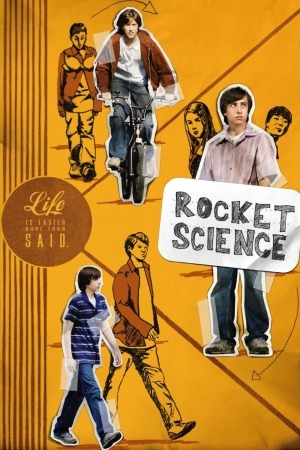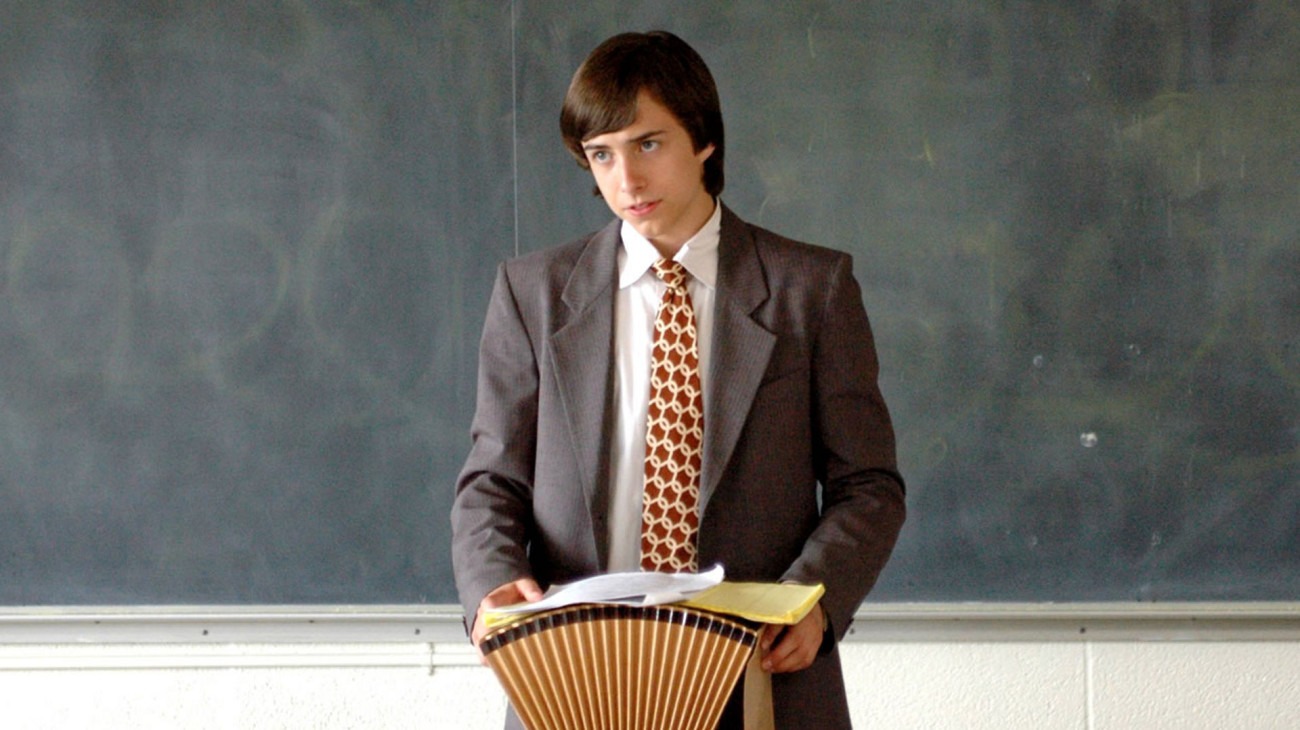
Indie dependant
I made a huge mistake in judging the chipper little indie comedy Rocket Science from its marketing campaign. See, based on that, I assumed it desperately wanted to be Little Miss Sunshine, and while I'm sure the distributor would love if that turned out to be the case, that simplification is a gross disservice to the ambitions and intentions of the filmmaking team.
Having seen the film, I can much more wisely claim that Rocket Science desperately wants to be Rushmore. With the narration from The Royal Tenenbaums.
Which nobody can blame it for: Rushmore and The Royal Tenenbaums are both awfully good. So even though Rocket Science almost always feels rather uncomfortably familiar, at least it has the good taste to steal from movies that I, for one, enjoy watching quite a lot.
Besides, it's not nearly so precious as those films. Here's the story: high school student (the year is left annoyingly vague, but it's freshman or sophomore) Hal Hefner (Reece Daniel Thompson) has a terrible stuttering problem and subsequent social anxiety. In a scene that feels a bit more contrived than one might hope for, he's scouted for the debate team by the loopy Ginny Ryerson (Anna Kendrick), a fast-talking Machiavelli who is convinced that she can turn him into an award-winner given enough time. Meanwhile, various quirky bodies revolve around Hal, making his none-too-pleasant life even weirder than it needs to be: his newly-divorced parents (Lisbeth Bartlett and Denis O'Hare); a tyrannical older brother (Vincent Piazza) who insists on referring to Hal using only girl's names; his mother's new boyfriend (Steve Park), the father of Hal's best friend (Aaron Yoo, who I'm extremely sad that I was instantly able to identify as "that guy from Disturbia); a sexually precocious young sociopath (Josh Kay), whose parent's play the Violent Femmes' "Blister in the Sun" on cello and piano, for no reason other than so that every review of the film will make reference to that fact.
The plot that emerges from this massive pit of character traits is generally free of the stickier types of sentimentality that plague indie films, although it is surely not free of contrivance: long before the point that Hal decides to sing during debates as a way to combat his stutter, the characters have largely abandoned "realistic" behavior. Not that this is a particular flaw, of course; it's just one of those things that it's best to observe and then ignore. With contrivance, in this instance, there is no story, and without story there is no film.
A much more important consideration, anyway, is whether or not the film is amusing, or if it's just ill-tempered and nasty, and my answer for that is a brilliantly helpful, "both...kind of." For you see Rocket Science is one of those cringey-funny movies, or it would be if it were actually funny. It's probably better to call it "wry." Hal suffers, often, and it's as likely to be the capricious whims of fate causing his suffering as his own hubristic actions. But because he is mostly sympathetic, we're not usually laughing at him in the "god, look at that horrible specimen of humanity" way. Instead, it's more likely to raise a thin-lipped smile of bittersweet recognition that yes, sometimes life does those things, and yes, that is sometimes how we would like to respond to it.
Because of this, the film isn't really laugh-out-loud hilarious - much too painful for that - but it's not supposed to be, I'd wager. It's good-natured, and there are plenty of lines that individually possess great (and occasionally laugh-out-loud great) dry wit, but the whole thing is kind of maudlin, although not so much that you could get away with calling it anything other than a "comedy."
It takes two people to make this work without turning into a joyless exercise in smug hipster irony, and those people are writer-director Jeffery Blitz and Reece Thompson. For Blitz, making his fiction debut five years after his much-beloved documentary Spellbound (which I still haven't seen, although I'm sure there are many interesting points of comparison between the two films), this is a deeply personal story, based in fact on his own adolescent problems with stuttering. This, I suppose, is why the story never drifts into the more assaulting humor that turns so many similar films sour. It's quite obvious that he loves Hal, and he wants us to love Hal, and that basic decency keeps the film watchable even at its most embarrassing.
As for Thompson, he is an extraordinary find. This is functionally his first film (after a tiny role in that actorly masterpiece Dreamcatcher, and a spear-carrying role in the deathless SuperBabies), and he pwns it, if you'll pardon my fr3nch. The characters in the film are uniformly grotesques, and for the most part they are played as such, but Thompson keeps something...I do not know...it would be far too much to say that he's charismatic, but he is very sweet and endearing, even when he's behaving like a deranged jackass.
All in all, there's not a lot of "there" here; although I respect the film in its refusal to sugar-coat, that has itself become fairly de rigeur among trendy dark indie comedies. There is no nice way to say this: I've seen this before, and you've probably seen this before, and while that doesn't make it "bad," it sure as hell makes it "uninteresting."
6/10
Having seen the film, I can much more wisely claim that Rocket Science desperately wants to be Rushmore. With the narration from The Royal Tenenbaums.
Which nobody can blame it for: Rushmore and The Royal Tenenbaums are both awfully good. So even though Rocket Science almost always feels rather uncomfortably familiar, at least it has the good taste to steal from movies that I, for one, enjoy watching quite a lot.
Besides, it's not nearly so precious as those films. Here's the story: high school student (the year is left annoyingly vague, but it's freshman or sophomore) Hal Hefner (Reece Daniel Thompson) has a terrible stuttering problem and subsequent social anxiety. In a scene that feels a bit more contrived than one might hope for, he's scouted for the debate team by the loopy Ginny Ryerson (Anna Kendrick), a fast-talking Machiavelli who is convinced that she can turn him into an award-winner given enough time. Meanwhile, various quirky bodies revolve around Hal, making his none-too-pleasant life even weirder than it needs to be: his newly-divorced parents (Lisbeth Bartlett and Denis O'Hare); a tyrannical older brother (Vincent Piazza) who insists on referring to Hal using only girl's names; his mother's new boyfriend (Steve Park), the father of Hal's best friend (Aaron Yoo, who I'm extremely sad that I was instantly able to identify as "that guy from Disturbia); a sexually precocious young sociopath (Josh Kay), whose parent's play the Violent Femmes' "Blister in the Sun" on cello and piano, for no reason other than so that every review of the film will make reference to that fact.
The plot that emerges from this massive pit of character traits is generally free of the stickier types of sentimentality that plague indie films, although it is surely not free of contrivance: long before the point that Hal decides to sing during debates as a way to combat his stutter, the characters have largely abandoned "realistic" behavior. Not that this is a particular flaw, of course; it's just one of those things that it's best to observe and then ignore. With contrivance, in this instance, there is no story, and without story there is no film.
A much more important consideration, anyway, is whether or not the film is amusing, or if it's just ill-tempered and nasty, and my answer for that is a brilliantly helpful, "both...kind of." For you see Rocket Science is one of those cringey-funny movies, or it would be if it were actually funny. It's probably better to call it "wry." Hal suffers, often, and it's as likely to be the capricious whims of fate causing his suffering as his own hubristic actions. But because he is mostly sympathetic, we're not usually laughing at him in the "god, look at that horrible specimen of humanity" way. Instead, it's more likely to raise a thin-lipped smile of bittersweet recognition that yes, sometimes life does those things, and yes, that is sometimes how we would like to respond to it.
Because of this, the film isn't really laugh-out-loud hilarious - much too painful for that - but it's not supposed to be, I'd wager. It's good-natured, and there are plenty of lines that individually possess great (and occasionally laugh-out-loud great) dry wit, but the whole thing is kind of maudlin, although not so much that you could get away with calling it anything other than a "comedy."
It takes two people to make this work without turning into a joyless exercise in smug hipster irony, and those people are writer-director Jeffery Blitz and Reece Thompson. For Blitz, making his fiction debut five years after his much-beloved documentary Spellbound (which I still haven't seen, although I'm sure there are many interesting points of comparison between the two films), this is a deeply personal story, based in fact on his own adolescent problems with stuttering. This, I suppose, is why the story never drifts into the more assaulting humor that turns so many similar films sour. It's quite obvious that he loves Hal, and he wants us to love Hal, and that basic decency keeps the film watchable even at its most embarrassing.
As for Thompson, he is an extraordinary find. This is functionally his first film (after a tiny role in that actorly masterpiece Dreamcatcher, and a spear-carrying role in the deathless SuperBabies), and he pwns it, if you'll pardon my fr3nch. The characters in the film are uniformly grotesques, and for the most part they are played as such, but Thompson keeps something...I do not know...it would be far too much to say that he's charismatic, but he is very sweet and endearing, even when he's behaving like a deranged jackass.
All in all, there's not a lot of "there" here; although I respect the film in its refusal to sugar-coat, that has itself become fairly de rigeur among trendy dark indie comedies. There is no nice way to say this: I've seen this before, and you've probably seen this before, and while that doesn't make it "bad," it sure as hell makes it "uninteresting."
6/10






